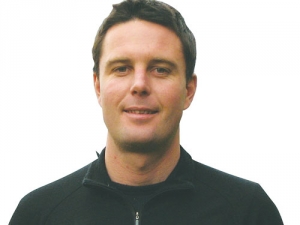Farmers warned to upgrade as 3G shutdown looms
As the clock ticks towards the 3G mobile network shutdown, farmers are being warned to upgrade or risk losing connection to their supply chain.
 Wairarapa farmer Marcus Edge now uses online software and a mobile app for all farm management recordings.
Wairarapa farmer Marcus Edge now uses online software and a mobile app for all farm management recordings.
Online software and a mobile phone app are helping a sheep and beef farmer quickly and easily present data for farm assurance and compliance audits, says the supplier, Farm IQ.
Marcus Edge, South Wairarapa, this year changed his farm recording, using online farm management software and the mobile phone app.
Edge and his wife Vanessa lease 330ha at Pirinoa from a family member, the flat property suiting intensive finishing: chiefly they raise 2000 ewe lamb replacements for hill country breeders.
"We keep them for 12 months and lamb them and give the breeder back a rising two-tooth. Then we take their next batch of lambs off them," Edge says.
This enables the breeders to focus on other stock classes, he says, and they're also getting a well-grown, 65kg-plus two-tooth that will perform better through its lambing life as a result.
The Edges also finish about 300 bulls and steers.
"Currently we've got 162 yearling steers and 124 Friesian bulls. We buy them in as weaners in April-May and winter them on crops, then take them through spring and once all spring grass has been eaten we sell them store at about 400kg liveweight."
Dealing with several other farmers and different stock classes adds complexity, but Edge no longer uses a paper diary.
"I record everything with my mobile phone. In the past, if we drenched a mob of lambs I would mark it in the notebook and in the evening I'd transfer it to a diary. Now, I push a few buttons on the phone and it is done.
"NAIT transactions happen automatically when I record a sale or purchase of cattle on the system.
"And you are building up paddock history: I can go into the record for any paddock and look at the history of pasture covers, grazing days, what mobs have been in there, what fertiliser or chemicals have been applied and what crops have been grown."
Using the software means when the meat company assurance man came a few months ago Edge just had to print out a few reports. "All of our records were sitting there in our online database, so it was just a matter of hitting print."
He is also using the software to organise farm tasks and to test management options.
To coordinate farm work between himself, Vanessa and their shepherd, Edge has set up a plan for each class of stock through the whole new season and an online calendar shows when tasks need to be done. He can also set up stock rotations.
"Then in the morning our shepherd can see what stock movements need to be done and go and do them."
Edge also sees potential for using it to manage health and safety. And the software can be used as an investigative tool.
"For example one thing we've done this winter is put some cattle on kale and some on Swedes, and we've tracked their growth. I take their liveweights straight from my Tru-Test indicator and send them to my online database with my phone.
"I don't do any manual recording. The database is helping us decide what is more profitable for us."
Edge wants in future to use the software to provide the sheep breeders with information about what happened with their ewe replacements during the year they were grazed away.
"We could give them feedback including a printout of all animal health treatment, growth rates and reproduction data from the day they arrived to the day they left."
Combined with EID tagging, the software can also make mob management easier, he says, because it keeps track of what animal is from where, even in mixed mobs. And if they need to be drafted, the database provides a file for the auto-drafter.
Coming in at a year-end total at 3088 units, a rise of around 10% over the 2806 total for 2024, the signs are that the New Zealand farm machinery industry is turning the corner after a difficult couple of years.
New Zealand's animal health industry has a new tool addressing a long-standing sustainability issue.
The Government has announced that ACC will be a sponsor of this year's FMG Young Farmer of the Year competition.
As veterinary student numbers grow to help address New Zealand's national workforce shortge, Massey University's School of Veterinary Science is inviting more veterinary practices to partner in training the next generation of vets.
South Island dairy farmers will soon be able to supply organic milk to Fonterra.
Norwood has announced the opening of a new Tasman dealership at Richmond near Nelson next month.